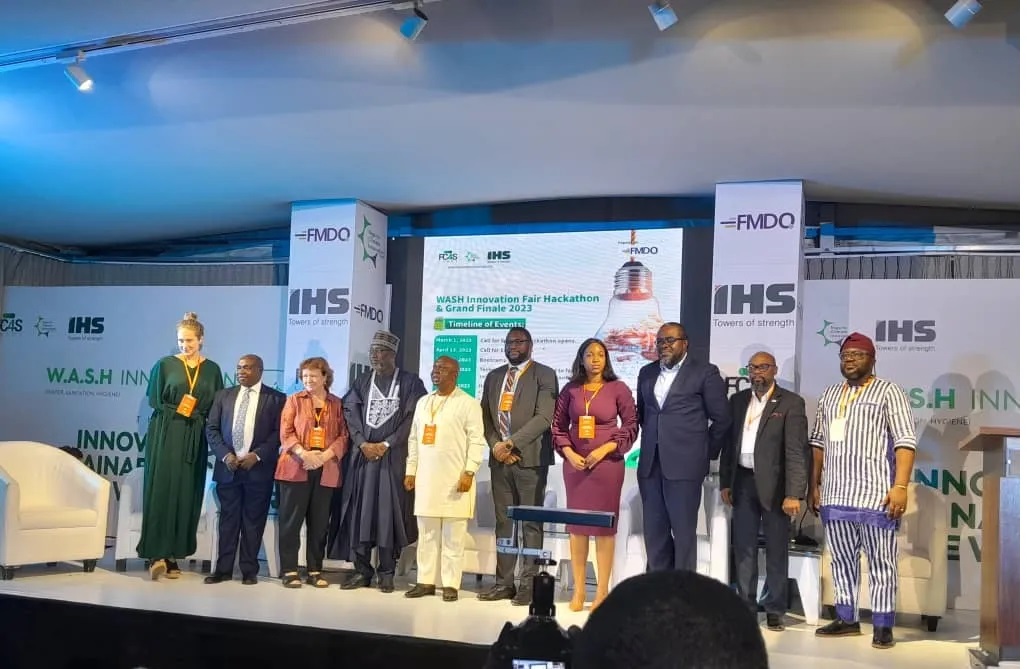Telecom
5 SMEs Emerge Winners at W.A.S.H Innovation Fair 2.0 with N3.5m Each

Five Small and Medium Enterprises (SMEs) at the Water Sanitation Hygiene (WASH) Hackathon Innovation fair 2.0 on Thursday won N3.5 million each with Four months incubation and mentorship programme.

The five innovators pitched their innovative idea that addresses challenges in Nigeria’s Water, Sanitation & Hygiene (WASH) sector. These innovators that emerged winners were SCHRODINGER TECH, RETREASURE, JUNKYARD, GREEN CYCLE and SPARKLES.
The programme, which was organised through the partnership of the Financial Centre for Sustainability, Lagos (FC4S LAGOS) and the Nigeria Climate Innovation Centre (NCIC), was sponsored by IHS, one of the largest independent owners, operators and developers of shared communication infrastructure in the world.
Speaking at the event, Engr Suleiman Adamu, Minister of Water Resources, said that WASH provides excellent platform for innovators and entrepreneurs to showcase their ideas
He noted that innovations designed to address challenges of open defecation and enhance access to safe Water, Sanitation and hygiene was salutary.
‘’It is my hope that these ideas, initiatives are brought to fruition so that the startups can contribute to plug into identified gaps for more effective intervention in the sector.
‘’The theme for this year’s fair, innovation for sustainable growth in the sector is timely, I mean against the backdrop of certain concerns about the shortfalls in the issue to access to safe water.
‘’It is also an important condition and a critical role in the development of the nation’s economy,’’ he said.
According to him, it is a critical component of our nation’s economy, it is essential to exploit globally available opportunities for the resolution of the challenges of the sector.
He said that the water sanitation sector offers immense opportunities for investment, job creation, and poverty reduction.
Adamu said that despite the substantial investments in the sector much more still needs to be done to improve access to clean water, sanitation and hygiene for our citizens.
According to him, “the sector is also beset with myriad of challenges mainly medical infrastructure, capacity, as well as poor service delivery at various levels”.
He said that in 2022, stakeholders had to find investment opportunities, estimated at about 3.8 billion US dollars in the WASH sectors.
According to him, this represents a significant opportunity that drive innovations and investment and allow opportunities to integrate creative solutions that would contribute to the resolution of identified challenges.
Adamu said that this initiative would further strengthen governance, improving access to safe water, sanitation and services to all Nigerians.
Through this initiative, the country is poised to be among those countries that have developed local innovative solutions, addressing challenges in the WASH sector.
According to him, hopefully these solutions would help strengthen the national action plan for W.A.S.H and help complement other national initiatives, such as partnership to expand the water supply, sanitation and hygiene which was launched in 2016.
The minister said that it was launched as a national collaborative instrument, to mobilise resources and harness efforts towards improving access to water sanitation and hygiene.
Earlier, Dapo Otunla, Chief Corporate Service Officer, IHS Nigeria, said that the organisation is committed to federal government’s plan to end open defecation by 2025.
He further noted that the firm has donated over 3000 books on open defecation to communities across Nigeria as well as installed 13 mechanised solar boreholes across communities.
According to him, about 138 communities have been impacted and over 18000 lives touched all in the effort to achieve the objectives of the WASH initiative.
Dr Jane Bevan, Chief WASH, Unicef Nigeria in her technical presentation highlighted the challenges of the WASH initiative in Nigeria.
She noted that poor investment in WASH both at the national and sub-national levels were some of the issues affecting the sector in Nigeria.
Telecom
NCC Orders Telcos Inform Subscribers of Data Breach within 48 Hours

Nigerian Communications Commission (NCC) has directed telecom operators in the country to notify affected customers of any data breach within 48 hours ( that is two day) of detecting such unauthorised infringement.

This directive was contained in the revised Internet Code of Practice 2026 by the NCC, on Friday.
The document seeks to define the rights and obligations of telecom operators in handing the rights of internet users to an open internet.
In the move to protect customer information, Mobile Network Operators (MNOs) and Internet Service Providers (ISPs) are to take necessary measures to protect customers’ data from unauthorised use, disclosure, access or breach.
Telecom operators must now notify affected customers within 48 hours of detecting a compromise through text message, email or any other effective means. As contained in Chapter 3.4 of the regulation titled “Data Breach Notifications,”
The telecoms companies are also directed to notify the NCC of such a breach not later than 48 hours after determining such a breach.
“Where full details of the breach are not immediately available, the provider shall issue a preliminary notification within the same period and furnish a comprehensive update within Fourteen (14) days thereafter, or within such extended period as the Commission may approve,” part of the section reads.
The guidelines, according to NCC, are in tandem with the provisions contained in the Nigerian Data Protection Act 2023 and Part VI of Schedule 1 of the Consumer Code of Practice Regulations 2024.
The regulation also joins other agencies’ policies, ensuring protection. Agencies such as the Nigeria Data Protection Commission (NDPC) and the Federal Competition and Consumer Protection Commission (FCCPC) protect consumers against misuse of personal data, identity theft, financial loss, and reputation damage.
The review comes at a time when privacy becomes core amid frequent breaches and illegal harvest of data such as biometric, national IDs, financial information, traffic and usage, and others.
Regulations are necessary for the proper handling, consent, and regulatory compliance regarding sensitive data, ensuring it is only processed for legitimate purposes.
Under Chapter 3.5, the Internet Code of Practice 2026 addressed the handling of harvesting of transactional data by notifying and getting approval from the NCC of any usage by a third party. It noted that the NCC approval will be defined by a review and assessment of such access and “its potential effects on national considerations, consumer information and personal data.”
Telecom
Globacom Promotes Valentine Gifting with Huge Discounts on Smartphones

Globacom has announced a Valentine Smartphone promotion, which provides incredible savings on a variety of high-end smartphones from top manufacturers including Tecno, Samsung, and Infinix.

Starting on February 9, the promotion provides substantial price reductions on a number of Samsung models, including the Galaxy Z Fold 7, Galaxy A07, Galaxy A56 5G, Galaxy A36 5G, and Galaxy A26 5G. Customers who buy any of the phones will also receive a complimentary travel pouch and charger, as well as up to 18GB of extra data for six months, only available on the Glo network.
Along with other Infinix models, Tecno devices are also offered at attractive discounts, giving customers a large range of smartphones to fit a variety of tastes and price ranges.
The goal of the Glo Valentine promotion is to provide customers with the best possible deals on carefully chosen smartphones that are renowned for their cutting-edge technology, stylish designs, and dependable performance. The offer, which includes alternatives to suit a range of budgets and lifestyles, reaffirms Globacom’s dedication to customer happiness, digital adoption, greater data usage, and client centricity.
The company revealed that the promotion aligned with customers’ expectations during celebratory seasons, when demand is highest for quality smartphones at affordable prices. The company added that its partnership with trusted global and regional brands such as Samsung, Infinix, and Tecno ensures that customers enjoy premium features without compromising on value.
“The Valentine season is about connection, and what better way to stay connected than with a smartphone that fits your needs and aspirations,” the company stated. “This promo gives our customers the chance to get their dream smartphones at some of the best prices of the year, along with generous data bonuses to keep them connected,” the company disclosed.
Customers are encouraged to visit Gloworld outlets nationwide to take advantage of the Valentine Smartphone Promo while stocks last.
Telecom
GBB Expands Broadband to 13 Underserved Communities In 2025

Galaxy Backbone Limited (GBB) has recorded a significant milestone in Nigeria’s digital transformation journey by advancing broadband connectivity to 13 underserved institutions and communities nationwide in 2025, reinforcing its position as the nation’s digital backbone and a trusted partner in national development.

Guided by its mandate to enable a digitally inclusive Nigeria, GBB deliberately extended connectivity to locations within reach of its infrastructure footprint, particularly institutions with strong potential for productive use but limited readiness for immediate commercial engagement. Through this effort, the organisation continues to unlock opportunity, stimulate innovation, and support sustainable growth across critical sectors of the economy.
The expansion reached three Federal Universities, two Local Government Areas, and eight Federal Secretariats, strengthening digital capabilities in education and public administration while enhancing service delivery across the country.
GBB also extended reliable broadband connectivity to strategic and cultural landmarks such as the Nnamdi Azikiwe International Airport, Abuja, underscoring its commitment to supporting national infrastructure that drives economic activity, mobility, and global connectivity.
These deployments highlight Galaxy Backbone’s resolve to bridge the digital divide and empower institutions that shape Nigeria’s future. They demonstrate the measurable national impact of GBB’s infrastructure investments and reflect the tangible progress of the Integrated Digital Transformation Strategy (IDTS), further solidifying the organisation’s role as the platform upon which government institutions and communities can confidently build their digital future.
More importantly, the milestone illustrates that GBB’s work extends beyond technology by enabling education, improving governance, supporting economic participation, and connecting citizens to opportunity.
The initiative aligns with the Federal Government’s broadband penetration objectives and complements national programmes such as Project 774 – Universities’ Hostel Connectivity, ensuring coordinated, scalable, and sustainable impact across the country. Commenting on the achievement, Galaxy Backbone noted that every new connection brings Nigeria closer to a more inclusive digital economy while reinforcing the infrastructure required for innovation and national competitiveness.
As implementation continues, GBB remains committed to expanding access, pushing boundaries, and delivering on the promise of a fully digital nation, with further updates expected as additional phases of the deployment progress.
Galaxy Backbone Limited is the Federal Government’s digital infrastructure and shared services provider, dedicated to delivering secure, reliable, and scalable ICT solutions that support efficient governance, innovation, and sustainable national development.

 E-Financial2 days ago
E-Financial2 days agoNDIC Intensifies Failed Banks Debt Recovery to Accelerate Depositors Payout

 News2 days ago
News2 days agoOpen Access Data Centres Acquires Seven NTT Data Centres Across South Africa

 Telecom2 days ago
Telecom2 days agoFG Seeks Private Sector Partnership to Bridge Broadband Gap

 Telecom2 days ago
Telecom2 days agoNIMC Flags Nationwide Ward-Level NIN Enrollment Drive from February 16

 E-Business2 days ago
E-Business2 days agoKaspersky Brings more Transparency to Threat Detection with New Hunt Hub

 General News2 days ago
General News2 days agoNigeria Market Powers Jumia’s Momentum as E-commerce Platform Demand Accelerates

 Broadcasting2 days ago
Broadcasting2 days agoDr. Cairo Ojougboh Foundation Bolsters Nigeria’s Education Drive with ₦2.7m Student Support

 E-Business2 days ago
E-Business2 days agoCybersafe Foundation Partners Google to Strengthen Cybersecurity Among CCIs in Africa
















